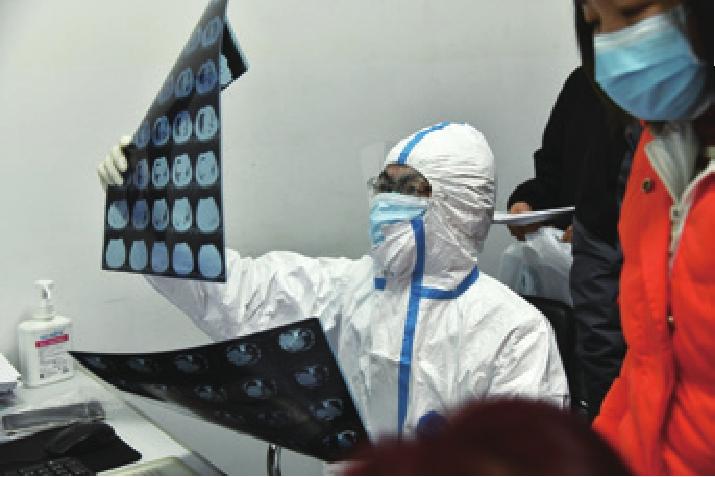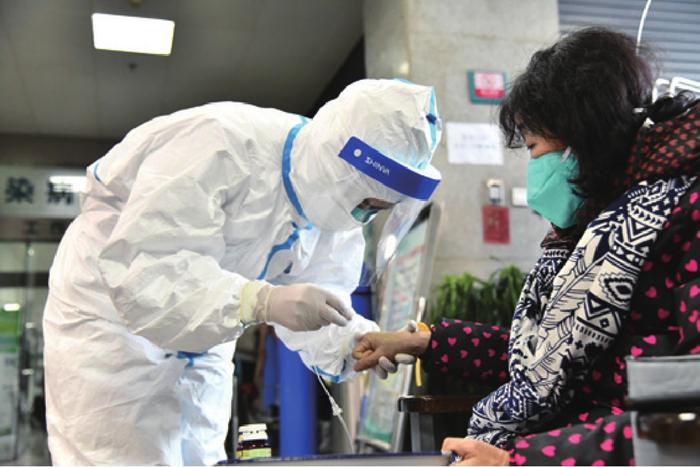Taking Up Responsibilities
By Zhi Mo

The Huazhong University of Science and Technology (HUST) in Wuhan, Hubei Province in central China, has been in the spotlight as a major battlefi eld for the fi ght against the novel coronavirus.
HUST is a leading comprehensive university under the administration of the Ministry of Education. It is the university that has devoted the largest number of hospital beds and the most medical workers to the fight against the virus, said Shao Xinyu, Secretary of the Communist Party of China Committee of HUST, on February 21, in an interview with China Central Television.
Experts in public health and preventive medicine, a leading subject at HUST, have made great contributions in combating the virus, providing professional suggestions to central and local governments regarding epidemic analysis, prevention and control measures and scientifi c popularization.
A strong fortress
All the 10 hospitals affi liated with the university have been designated to treat infected patients, providing 33,000 medical workers and more than 8,900 beds.
Of the 10 hospitals, the Union and Tongji hospitals are designated for critically infected patients. Four hospitals are designated for patients from certain areas. Three are for infected children, pregnant women and mentally challenged people, and one hospital has sent medical personnel to Wuhans temporary hospitals.
Doctors in the Union Hospital are among the earliest to fight the virus. On January 20, Zhong Nanshan, a renowned respiratory scientist, announced that 14 medical workers in Wuhan were infected by the virus. All of them are from the Union Hospital.
However, the news did not deter other doctors. On January 27, a doctor in the Union Hospital applied to join the fi ght against the virus, saying “I will fi ght the virus even if its at the expense of my own life.” This line has later been frequently quoted by other volunteer medical workers in their applications.
Zhu Bin, another doctor from the infectious disease department of the Union Hospital, was studying at a Shanghai hospital when the epidemic broke out. In late January, he decided to end his studies early to return to Wuhan. Since many fl ights and trains to Wuhan had been canceled as part of epidemic control, Zhu had to take a plane to Changsha, capital of neighboring Hunan Province, and then a taxi to Wuhan. The whole trip took him two days.
These affiliated hospitals have also been offering online consulting services and developing diagnosis and treatment guidelines.
On January 21, the Tongji Hospital formulated a quick diagnosis and treatment guideline for clinical practices in Hubei.
On January 24, the fever outpatient department of the hospital opened an online outpatient service. The number of inquiries on the fi rst day reached over 10,000.
On January 26, the fi rst nucleic acid testing laboratory for the virus in Hubei was established at the Union Hospital.
The pathology team from the Department of Forensic Medicine of Tongji Medical College has carried out postmortem exams on nine people who died of the disease to find its pathogenesis and provide reference for future treatment.
The Institute of State Governance of HUST has conducted comprehensive research into virus prevention and control and the mod-ernization of public health governance and proposed a series of targeted suggestions and solutions.

The Tongji Medical College is among the top medical colleges in China. It has trained many renowned doctors who are now academicians.
The colleges history stretches back over 100 years. Its predecessor was the German medical college established by Erich Paulun in Shanghai in 1907, which fi lled a gap in Chinas modern medical education.
Tongji means working together to overcome difficulties. In 1927, the college was renamed Tongji University and in February 1950, it moved to Wuhan and merged with the Wuhan University Medical College. It was renamed Tongji Medical University in July 1985. After merging into HUST in 2000 to become its medical college, the college took over seven other special and comprehensive hospitals to increase the number of its affi liated hospitals to 10 in 2016.
Important role
HUST was formed from a merger of Tongji Medical University, Wuhan Urban Construction College and Huazhong University of Technology in 2000.
Over the past decades, HUST and its predecessors have played important roles in mitigating major national disasters. During the schistosomiasis outbreak in the suburbs of Shanghai in 1950, the prototype of todays Tongji Medical College called on its teachers and students to go to the frontline to help prevent and control the disease.
During the flood disaster in Wuhan in 1954, over 1,000 people from the medical college took part in disaster relief and medical care. When a 7.8-magnitude earthquake hit Tangshan in Hebei Province in north China in 1976, 130 medical workers from Tongji rushed to the area and treated over 15,000 injured people in the course of a month.
In addition, 45 medical teams from Tongji took part in relief work in the most dangerous areas of Hubei during the 1998 Yangtze River fl ood.
In 2003, during the severe acute respiratory syndrome (SARS) outbreak, nearly 20 experts from the college joined various research and command centers and 12 medical workers were sent to work at the Xiaotangshan Hospital, a temporary hospital in Beijing for treating SARS patients. Medical workers from HUST-affi liated hospitals also provided services after an 8-magnitude earthquake hit Wenchuan, Sichuan Province in southwest China in 2008.
On February 8, HUST called on its alumni around the world to help their alma mater, Wuhan and Hubei. As of February 23, over 50 HUST alumni associations, tens of thousands of alumni and many enterprises established by HUST alumni had donated materials worth over 300 million yuan ($42.8 million) to more than 100 hospitals in Wuhan and other cities in Hubei, and over 16 million yuan ($2.28 million) of epidemic prevention fund to HUST.
In the fi ght against the epidemic, the HUST faculty, students and alumni have shown the spirit of unity, Li said. HUST has always aimed to cultivate high-caliber talent who are patriotic, dedicated and with professional skills. This is what a world class university should pursue.

